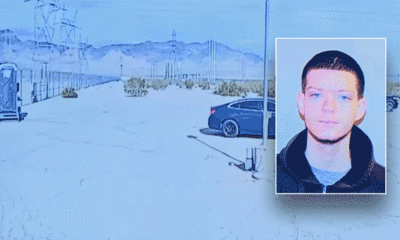LAS VEGAS (KSNV) — A string of deadly crashes in and around Pahrump has prompted Nye County Sheriff Joe McGill to push for more safety measures along dark, sidewalk-free roads.
“The worst penalty is death, if you consider that,” McGill said.
The recent deaths include a single-vehicle rollover on State Route 160 during the morning hours of the last Wednesday in January that killed one person and injured another.
Then, into February, two pedestrians were killed in less than three days.
The first was a 7 p.m. crash on Quarter Horse Avenue. Investigators believe a 2006 Jeep Liberty was driving on the street when it hit a pedestrian, who was pronounced dead at the scene.
A few days later, this last Saturday, state troopers responded to a crash just after sundown at Charleston Park Avenue. A sedan hit a pedestrian, who was also pronounced dead at the scene.
Nevada State Police investigators are still investigating both pedestrian cases before more details are released.
McGill said the recent crashes were enough to spur action.
“When the third one came out, I was sitting at home and watching TV. I looked at my wife and I said, ‘We got to do something about this,’” McGill said.
McGill is responding with a reflective vest giveaway, pointing to limited infrastructure as a possible factor. He noted a lack of street lights off State Route 160 and no sidewalks inside the community.
“The only light that you have is the ambient light from houses and cars so it is really dark,” McGill said.
John Treanor of AAA Nevada said poor visibility can quickly turn dangerous for both drivers and pedestrians.
“It is very easy to be confronted with a situation that you cannot see coming because the visibility might be bad,” Treanor said.
Treanor encouraged pedestrians to carry lights and drivers to be prepared if they end up outside their vehicles in dark conditions.
“Having lights on you. Even carrying a flashlight allows something where a driver can see it,” Treanor said. “If you are a driver, make sure you have the right stuff in your car, in case you do get in a situation where you are on the side of the road and now you are in dark. Make sure you have a kit with some reflectors, some lights. Anything the trunk of your car in case you need it.”
McGill said vigilance is important even in daylight.
“Any time of the day, you have got to be vigilant. You have to keep aware of your surroundings if you are a walker or on a bicycle or if you are the driver,” he said.
Authorities also urged caution as more people may pull off roads in rocky areas along the route toward Death Valley National Park during springtime blooms, increasing the need for drivers and pedestrians to stay alert.










































